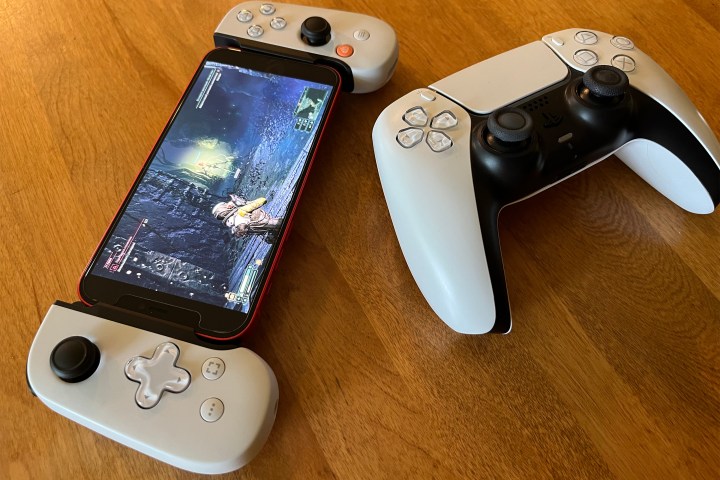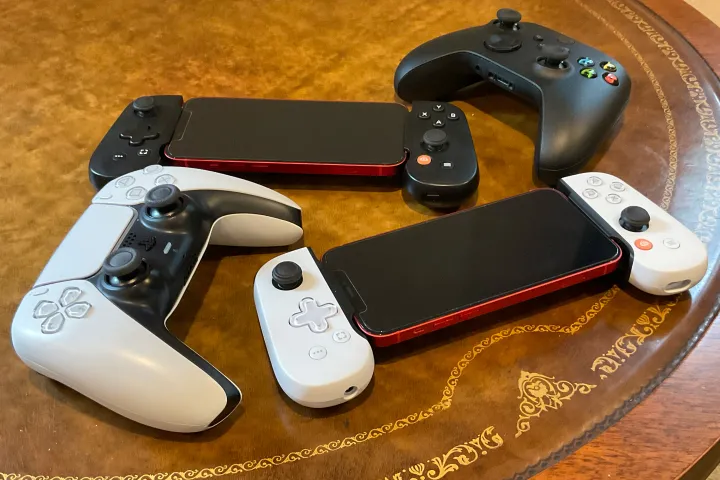The Backbone is my favorite mobile controller. It’s a solid pick for anyone looking to game on the go, but it always skewed heavily in a Microsoft direction due to its matching Xbox face buttons and heavy Game Pass marketing. Sot was exciting when PlayStation announced that it would be officially partnering with Backbone to make a PlayStation-centric version of the mobile controller I’ve come to love.
Now that I have it in my hands, however, I’m left asking myself, “Is this really what I wanted?” In marketing the controller, both Backbone and PlayStation made it clear that it’s not meant to be a mobile DualSense, but I still couldn’t help but feel disappointed. It’s a Backbone colored like a DualSense that features PlayStation face buttons, but that’s it. The description on the product listing on the Backbone website says that the controller is “inspired by the look and feel of the PS DualSense,” but it only makes good in the looks department of that statement.
Despite being “inspired” by the DualSense, the PlayStation Backbone doesn’t have a single one of the features that have come to define the controller of the PS5 generation. Normally, I’d say that my disappointment is the result of misaligned expectations, but after giving a handful of first-party PlayStation 5 games a try using the PlayStation Backbone, I think there’s a deeper problem at work.
An incomplete package
The DualSense is an excellent controller. On a base level, it’s extremely comfortable to hold and has a real weight and level of responsiveness to it. It’s essentially everything you need in a controller and more thanks to its exclusive features like haptic feedback, adaptive triggers, and 3D audio. These are features that, in one way or another, every PlayStation 5-exclusive title has capitalized on, giving each one a literal unique feeling.
The PlayStation Backbone has none of that. It’s a standard gamepad that, while still of high quality, is about as bare-bones as you can get. That normally wouldn’t be a problem if this were some unheard-of third-party device, but because it’s an official PlayStation product, the fact that those features are missing is a huge problem when you go to play PS5 games.

I tested out a handful of PS5-exclusive titles using the PlayStation Backbone and was left feeling underwhelmed. Things were off to a poor start when I booted up Astro’s Playroom, a game that comes automatically downloaded on every PS5 and, while certainly fun in itself, essentially serves as a tech demo for the DualSense.
To be blunt: The game is borderline unplayable using the PlayStation Backbone. There are missing features throughout such as the 3D audio footsteps of Astro Bot walking around the interior of the PS5. The game comes to a complete stop when faced with any of the “gimmick sections” of the levels that require things like tilting the controller, blowing into it to power fans, or using the touchpad with any level of precision.
Astro’s Playroom was the only PS5 game that was unfinishable on the PlayStation Backbone, but that’s not to say that it was the only one that felt compromised. The next games on my list were Returnal and Ratchet and Clank: Rift Apart, two games that also lean heavily into the features of the controller that would be absent on the mobile version. Playing them both went about as well as you might expect.
Playing through the problems
The big problem that I anticipated when getting ready to play both Returnal and Rift Apart was the fact that both games made use of the adaptive triggers not just to simulate things like resistance or a jammed weapon, but as additional buttons necessary for being successful at the games’ combat. Luckily, they both offer alternate control schemes that map those half and full pulls of the trigger to different places on the controller, but there’s nothing to say that all PS5 exclusives will be so willing to let players remap the triggers to other buttons.
Other than the lack of adaptive trigger support, it still felt like there was something missing from just about every PS5 title I tried: Astro’s Playroom, Returnal, Ratchet and Clank, Ghostwire: Tokyo, Demon’s Souls, and Deathloop. They all seemed to have a newfound flatness of sorts because of the lack of other DualSense features like 3D audio and haptic feedback. The games can definitely stand on their own without DualSense features (except for Astro’s Playroom), but a major sense of the PlayStation 5’s uniqueness is certainly lost.

It would be a lot to expect a mobile controller to have all of the features of the DualSense, but the fact that it doesn’t boast any is a pretty big letdown. Other third-party PS5 controllers like the Scuf Reflex are able to include DualSense-exclusive features so it doesn’t feel entirely unreasonable to expect an official PlayStation partner to be able to include some as well. This is especially the case because the PlayStation Backbone costs $100, $30 more than a new DualSense.
It’s worth pointing out that PS5 games that launched alongside PS4 versions still play fine using the PlayStation Backbone because they need to run on both the DualSense and the DualShock 4, so they tend not to rely on features that wouldn’t work without DualSense support. This means that if you’re looking to play Horizon: Forbidden West or the hotly anticipated God of War: Ragnorok on the go, you won’t be running into any major issues.
The lack of features on the PlayStation Backbone isn’t a complete deal-breaker; it’s still a Backbone, which is one of the best mobile controllers on the market. It just feels completely removed from what makes the PlayStation 5’s controller unique. When used for general mobile gaming (which seems to be what Backbone is more concerned with), it’s still just about everything you’d want out of a controller, however, the fact that it’s a PlayStation-branded controller makes it feel like it should have more to it. That’s especially true when thinking about the laundry list of innovations PlayStation has brought to gaming controllers with the introduction of the DualSense.
It’s a great controller, but it’s a bad PlayStation controller.



